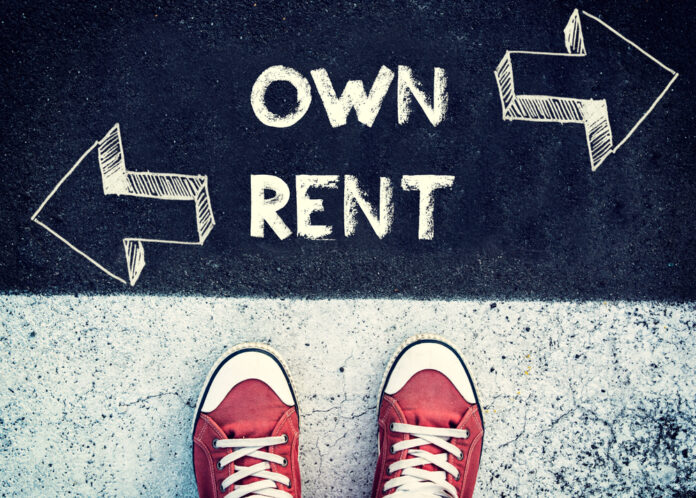There’s no denying that purchasing a home is a significant milestone, but is it ideal for you? Of course, there is no one perfect answer because both renting and owning have advantages and disadvantages. Personal finances, on the other hand, are a key component in anyone’s decision-making process. In most situations, renting appears to be the most cost-effective alternative.
But this isn’t always the case. Several lifestyle factors, like whether you desire mobility or stability, your professional objectives, and if you want a place to call your own genuinely, may all influence your decision.
If you’re contemplating whether to rent or own, keep reading to figure out what you should look at before deciding.
Renting Vs. Buying: Advantages and Disadvantages
Apart from your personal circumstances, there are certain objective advantages and disadvantages to renting versus owning that will prevail in most cases.
Renting Advantages and Disadvantages
Advantages
• Ability to move around
• Less paperwork and upfront expenses
• Maintenance and repairs are not your responsibility
• No reason to be concerned about declining house values
• No estate tax bills
Disadvantages
• The landlord can sell the house or increase the rent
• Don’t build equity
• Your options may be limited depending on the number of vacancies
• No tax benefits
• You may have to relocate several times
Owning Advantages and Disadvantages
Advantages
• Build credit and equity over time
• Sense of permanence
• Possible tax benefits
• Can improve or upgrade the property to your taste
• Property value may increase
Disadvantages
• Responsible for maintenance and repairs
• Requires a lot of money and paperwork upfront
• Less flexibility to relocate
• Property value may decrease
Rent or Own: Steps for Making a Decision
Determine how long you intend to stay in the same location
In other words, do you want to settle your area, or do you want greater flexibility?
Buying property may make sense if you are positive you will stay in it for at least five years. That’s because it might be a wonderful fit both emotionally and financially – you can add personal touches to the house and truly make it yours.
Nevertheless, if you want to be more mobile, renting is the preferable alternative. For instance, let’s assume you’re desperate for that work promotion, and it’s halfway across the nation. You wouldn’t want to cope with the stress of selling a house while moving to a new job.
Of course, you can purchase a house and then put it on the market after a few years, but the fees are too high. Aside from the original closing and moving fees, you may incur additional closing expenses when selling a property, plus other expenses like repairs and improvements that would increase the property’s value.
Evaluate The Price of Renting Versus Buying
Due to the upfront costs, renting might be less expensive than owning a property in many situations. This includes your down payment, closing fees, moving expenses, renovations, and other property maintenance duties.
You should know affording the mortgage payments does not guarantee you can afford a house; costs accumulate. Aside from the payments, you’ll also have homeowners’ insurance, property taxes, and, in several circumstances, mortgage insurance and homeowners’ association fees.
On the other hand, buying a house can be less expensive in the long term and provides an opportunity to create equity. Not only that but being a homeowner may save you money on taxes.
That’s not to imply you should go out and buy a house right away. It’s acceptable to rent for some years, save money, and then purchase a house if you’re dead bent on becoming a homeowner. The cost savings of becoming a homeowner also presume that you will live in the house for a long time and may not include maintenance expenditures. Nevertheless, if you pay off the home loan and continue to stay in the property, the savings can be considerable, even when home maintenance expenses are considered.
Mobility Vs. Settling: Which is Important to you?
Buying a house may prove very useful if you want to stay in one area for an extended period and possess the financial resources to do so. However, it’s critical to consider your current life circumstances and if they will change in the next years. Since if it does, your dwelling requirements may also alter.
Weigh the Benefits and Drawbacks of Renting vs. Buying
As previously stated, there are drawbacks associated with both renting and purchasing a house. Although purchasing a house allows you to create equity, there are certain financial drawbacks. For one thing, if your regional real estate market suffers a slump, you might lose money. Or, if you list your property sooner than you planned, you might not recoup what you spent on closing fees or renovation.
Not to mention maintenance expenses. These are the costs you’ll have to bear in order to keep your house in good shape. Updating vents and air filters, landscaping, testing fire alarms, and repairing plumbing concerns are just a few examples.
If you have other priorities in life, such as a profession that involves frequent travel or several young children, adding house upkeep to your pile of obligations might not be the greatest decision.
On the other hand, renting implies you won’t develop equity as you would if you bought the property. Your rent might increase at any time. You’re also at your landlord’s mercy, who may order you to vacate or postpone repair requests.
Examine Your Financial Status
It is critical to remember that you must be realistic with your financial condition while selecting between renting and purchasing. Once you’ve calculated the cost of renting vs. buying, be realistic about whether you will afford extra upfront expenses like a down payment, relocation expenses, repairs, and purchasing new furnishings. In either scenario, do some diligent budgeting so that you can afford a house or rent regardless of what you decide.
